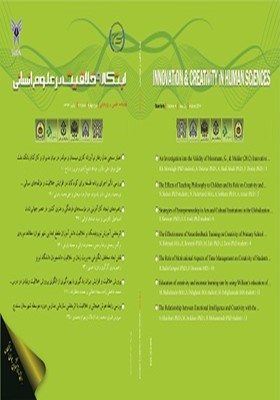The Effects of Teaching Philosophy to Children and Its Role on Creativity and Components Fluidity, Originality, Flexibility, and Expandability
Subject Areas : Creativity and innovation from psychological, epistemological, educational and pedagogicalNoor Mohammad Rezaei 1 , Nader Padervand 2 , Abdolreza Sobhani 3 , Ali Mohammad rezaei 4
1 - دانشگاه آزاد اسلامی واحد تهران مرکزی، باشگاه پژوهشگران جوان و نخبگان، تهران، ایران (نویسندة مسئول) rezaee165@gmail.com
2 - کارشناس ارشد برنامهریزی درسی از دانشگاه آزاد تهران جنوب nader165@gmail.com
3 - عضو هیئتعلمی دانشگاه آزاد واحد تهران جنوب abdsobhani@gmail.com
4 - استادیار دانشگاه سمنان rezaei_am@yahoo.com
Keywords: Creativity, Training, Philosophy for children, philosophy,
Abstract :
Background: Many researchers consider teaching philosophy to children as one of the main tools for fostering critical and creative thinking skills among them. Objective: The current research aims to survey the role of teaching philosophy to children on their creativity and its components among the fifth grade primary school boy students in five schools in Tehran. Method: The authors used post-test method with control group. To this purpose some 100 students (4 classes) were selected among fifth grade primary school students. The students were taught during 13 sessions for 45 minutes (1 session in a week) by Sharp Lipman community of inquiry and Phillip Cam thinking stories, then the Torrance tests of creative thinking were executed. Results: The results of MANOVA indicate effects on components fluidity and flexibility and total score of creativity and showed no effect on originality and expandability of the students. Conclusion: By teaching philosophy to children, we can increase their creativity.


